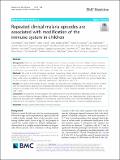Repeated clinical malaria episodes are associated with modification of the immune system in children
Abstract
Background There are over 200 million reported cases of malaria each year, and most children living in endemic areas will experience multiple episodes of clinical disease before puberty. We set out to understand how frequent clinical malaria, which elicits a strong inflammatory response, affects the immune system and whether these modifications are observable in the absence of detectable parasitaemia. Methods We used a multi-dimensional approach comprising whole blood transcriptomic, cellular and plasma cytokine analyses on a cohort of children living with endemic malaria, but uninfected at sampling, who had been under active surveillance for malaria for 8 years. Children were categorised into two groups depending on the cumulative number of episodes experienced: high (≥ 8) or low (< 5). Results We observe that multiple episodes of malaria are associated with modification of the immune system. Children who had experienced a large number of episodes demonstrated upregulation of interferon-inducible genes, a clear increase in circulating levels of the immunoregulatory cytokine IL-10 and enhanced activation of neutrophils, B cells and CD8+ T cells. Conclusion Transcriptomic analysis together with cytokine and immune cell profiling of peripheral blood can robustly detect immune differences between children with different numbers of prior malaria episodes. Multiple episodes of malaria are associated with modification of the immune system in children. Such immune modifications may have implications for the initiation of subsequent immune responses and the induction of vaccine-mediated protection.
Citation
Bediako , Y , Adams , R , Reid , A J , Valletta , J J , Ndungu , F M , Sodenkamp , J , Mwacharo , J , Ngoi , J M , Kimani , D , Kai , O , Wambua , J , Nyangweso , G , De Villiers , E P , Sanders , M , Lotkowska , M E , Lin , J W , Manni , S , Addy , J W G , Recker , M , Newbold , C , Berriman , M , Bejon , P , Marsh , K & Langhorne , J 2019 , ' Repeated clinical malaria episodes are associated with modification of the immune system in children ' , BMC Medicine , vol. 17 , 60 . https://doi.org/10.1186/s12916-019-1292-y
Publication
BMC Medicine
Status
Peer reviewed
ISSN
1741-7015Type
Journal article
Description
The study received funding from the UK Medical Research Council, (MRC Programme grant #: MR/M003906/1). MB and AR are supported by the Wellcome Trust (Grant #: WT 206194).Collections
Items in the St Andrews Research Repository are protected by copyright, with all rights reserved, unless otherwise indicated.

